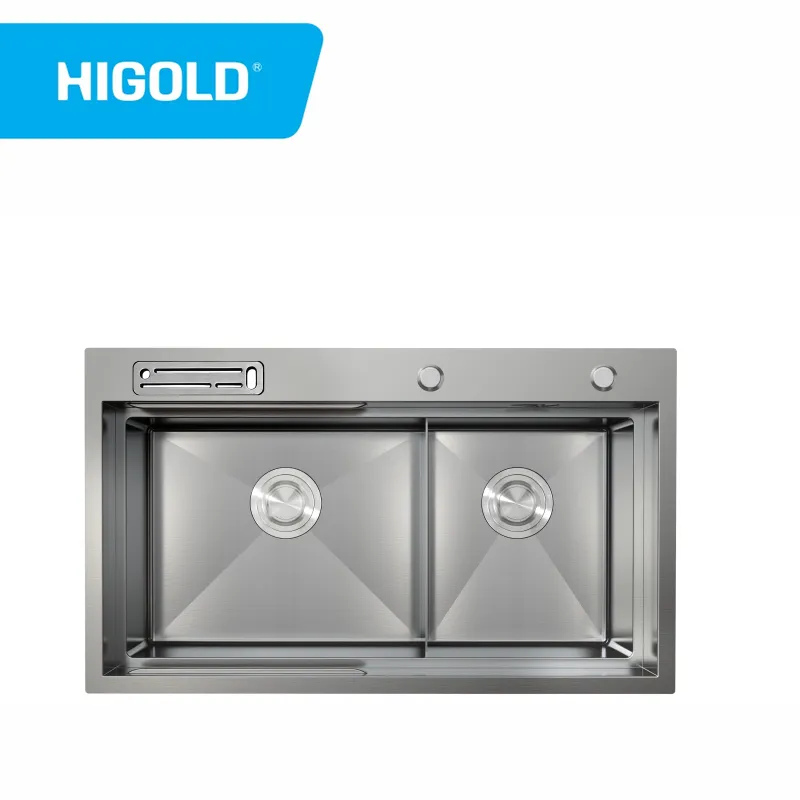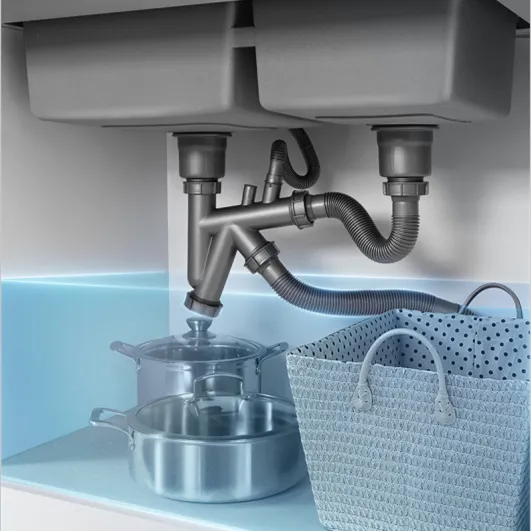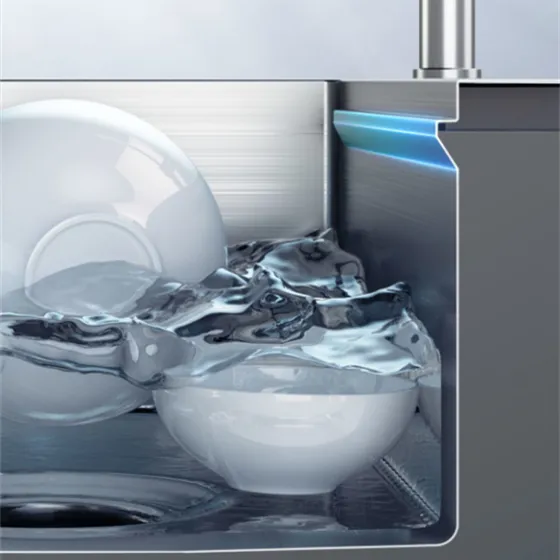In daily life, the kitchen is one of the most important places in the family, but it can easily become a breeding ground for various problems. Among them, the unpleasant odor of the stainless steel kitchen sink is a problem that many families may encounter. This unpleasant odor not only affects the sanitation of the kitchen, but may also spread to the entire home space, making people uncomfortable.
However, how does this odor come about? And how should it be solved? This article will deeply analyze the causes of the odor of the stainless steel kitchen sink, the common specific causes and effective solutions to help you restore the freshness and cleanliness of the kitchen.

What is the cause of the odor of the stainless steel kitchen sink?
The root cause of the unpleasant odor of the stainless steel kitchen sink is usually closely related to the structure and use of the sink drainage system. The stainless steel kitchen sink is an important drainage channel for the family kitchen. Oil, food residues and other debris can easily enter the drainage pipe with the water flow. If it is not cleaned in time or there are structural problems, bacteria may breed and form odors. In addition, the drainage system of the stainless steel kitchen sink is directly connected to the sewer. If the gas in the sewer pipe cannot be effectively blocked, it will also smell and enter the kitchen.
Simply put, the causes of the odor of the stainless steel kitchen sink can be attributed to the following points:
Accumulation of food residues and grease: Unfiltered food debris and grease enter the stainless steel kitchen sink drain pipe, ferment and rot over time, forming a bad smell.
● Blockage or partial blockage of the drain pipe: Poor drainage causes sewage to stay for a long time, producing odor.
● Sewer odor: Harmful gases in the sewer, such as hydrogen sulfide and methane, enter the kitchen through the drainage pipe, causing unpleasant odors.
● Water seal loss: The stainless steel kitchen sink is usually equipped with a "U-shaped pipe" or "P-shaped pipe", whose main function is to form a water seal to block the upwelling of sewer gas. Once the water seal fails, the odor will enter the kitchen.
● Bacteria and mold breeding: Wet drainage pipes can easily become a breeding ground for bacteria and mold, producing odors.

Analysis of the specific reasons for the odor of stainless steel kitchen sink
1. Food residue and grease accumulation and decay
The stainless steel kitchen sink is an important place for washing vegetables, washing dishes, and processing food ingredients. Food residue and grease will inevitably flow into the drainage system of the sink. If the stainless steel kitchen sink filter is not cleaned in time, or food debris directly enters the drainage pipe, it will gradually accumulate in the pipe, especially at the bend of the pipe. These residues will gradually rot and ferment over time, releasing odorous gases such as hydrogen sulfide, producing odor.
Solution:
● Clean the filter of the sink regularly to prevent food residue from entering the drainage pipe.
● Use hot water and detergent to clean the stainless steel kitchen sink to help dissolve grease and prevent accumulation.
● You can regularly pour baking soda and white vinegar for cleaning and deodorization.
2. The drain pipe is blocked or partially blocked
Drain pipe blockage is one of the common causes of odor in stainless steel kitchen sinks. When there are solid food residues, grease accumulation or other foreign matter in the drainage pipe, it will cause poor drainage. Sewage that stays in the pipe for a long time is prone to breed bacteria and produce odor. In addition, partial blockage may cause slow water flow, making the odor more obvious.
Solution:
● Use pipe unclogging agents or pipe cleaning tools to clean the drainage pipes and remove blockages.
● Pour hot water to help dredge grease, and use cleaning materials such as edible alkali and baking soda to remove oil and deodorize.
● Develop the habit of not pouring large pieces of food crumbs into the sink to avoid blockage again.
3. Sewer odor problem
The drainage pipe of the stainless steel kitchen sink is connected to the household sewer system, and the sewer is often filled with gases produced by decaying substances, such as hydrogen sulfide, ammonia and methane. These gases not only have a strong odor, but are also harmful to health. If the drainage pipe is not well sealed or the water seal fails, the gas in the sewer may flow back into the kitchen.
Solution:
● Check whether the water seal of the stainless steel kitchen sink is normal and ensure that there is enough water seal in the "U-type pipe" or "P-type pipe".
● If the sink is not used for a long time, you can add a small amount of clean water to replenish the water seal to prevent the sewer gas from odor.
● Ensure that the seal at the interface between the drainage pipe and the sewer is good, and replace the aged seal ring if necessary.
4. Odor caused by water seal failure
The water seal is the key to preventing the sewer gas from rising. The "U-shaped pipe" or "P-shaped pipe" in the stainless steel kitchen sink drainage system forms a seal by storing a certain amount of water to isolate the sewer odor. However, if the water seal fails due to water evaporation, blockage or other problems, the odor will enter the kitchen.
Solution:
● Check whether the water seal pipe is operating normally, replenish water, and form an effective water seal.
● Clean the blockage in the water seal pipe to ensure smooth water flow and prevent gas backflow.
● If the water seal pipe is damaged, it should be replaced in time to restore its sealing function.
5. Bacteria and mold growth
The gaps around the damp drainage pipe and the stainless steel kitchen sink are the most likely places for bacteria and mold to grow. Especially in a high temperature environment, the gas produced by bacteria decomposing residual substances will release a noticeable rancid smell. This smell not only affects the environment, but may also endanger human health.
Solution:
● Use disinfectants or detergents to disinfect sinks and drain pipes regularly to inhibit bacterial growth.
● Use a brush to clean the inner wall of the drain pipe to remove attached oil and residue.
● Develop good kitchen hygiene habits, keep the sink clean and dry, and reduce the chance of bacterial growth.

How to prevent the odor of stainless steel kitchen sinks?
In order to avoid the recurrence of the odor problem of stainless steel kitchen sinks, you need to pay attention to the following points in daily life:
● Use a filter: Install a filter at the outlet of the stainless steel kitchen sink to prevent food residues and debris from entering the drainage pipe.
● Clean the sink regularly: Clean the sink and drain pipe once a week, and use hot water, baking soda, white vinegar and other cleaning materials to remove oil and odor.
● Keep the sink dry: After using the sink, wipe the surface of the sink dry to reduce moisture residue and prevent bacterial growth.
● Avoid pouring grease into the sink: Grease easily solidifies in the drain pipe and causes blockage. Grease should be poured into the trash can.
● Check the pipes regularly: Check whether the water seal is normal, clear the blockage, and ensure smooth water flow.

How Do Higold’s Advanced Manufacturing Techniques Ensure Product Quality?
At Higold, we prioritize automation in our manufacturing processes. We’ve invested heavily in laser cutting machines, robotic welding systems, and ultrasonic cleaning lines to maintain consistent, high-quality standards for our steel kitchen sinks. Our investment in these advanced technologies ensures that our products remain affordable and competitive in the global market while maintaining the high quality you expect.


